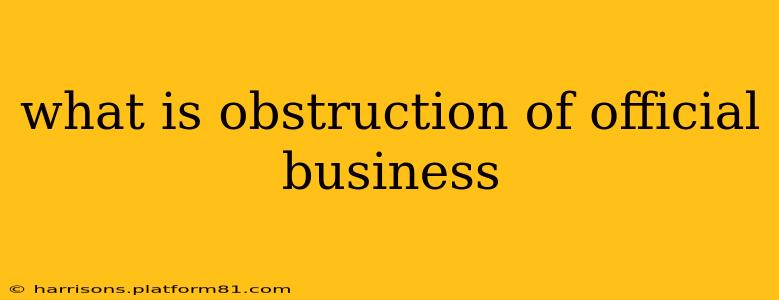Obstruction of official business, also sometimes referred to as interfering with a public official, is a crime that involves hindering or impeding a government employee from performing their legal duties. It's a serious offense with potentially significant penalties, varying greatly depending on the jurisdiction and specific circumstances. This crime isn't about simply disagreeing with a government action; it's about actively interfering with the legitimate performance of their job.
What Constitutes Obstruction of Official Business?
The specific actions that qualify as obstruction of official business vary by state and even by specific statutes. However, generally, it involves any act that intentionally interferes with a public official's ability to conduct their lawful duties. This could include:
- Physical Interference: This is the most straightforward form, encompassing actions like physically blocking an officer's path, assaulting an officer, or damaging government property to prevent them from performing their work.
- Verbal Interference: While less obvious, yelling obscenities, making threats, or using intimidating language to prevent an officer from completing their task can constitute obstruction.
- Providing False Information: Deliberately misleading or providing false information to a public official, hindering their investigation or ability to perform their duties, is a common form of obstruction. This could involve lying about your identity, providing false documentation, or withholding crucial information.
- Passive Resistance: While not always explicitly criminal, refusing to cooperate with a lawful request from a public official, particularly if it creates significant impediments to their investigation or duties, can be considered obstruction in certain circumstances. This could involve refusing to identify yourself or refusing to comply with a lawful arrest.
- Interfering with Official Records or Equipment: Tampering with evidence, destroying official documents, or damaging or disabling equipment used by public officials in the performance of their duties is a clear violation.
What are the Penalties for Obstruction of Official Business?
Penalties for obstruction of official business are highly variable. Factors influencing the severity of the punishment include:
- The nature of the obstruction: Physical violence will likely result in much harsher penalties than verbal interference.
- The identity of the official being obstructed: Interfering with a high-ranking official or one involved in a sensitive investigation may lead to more severe consequences.
- The jurisdiction: State and federal laws vary significantly. A misdemeanor in one state could be a felony in another.
- The defendant's prior record: A prior criminal history will likely result in a harsher sentence.
Penalties can range from fines and community service for minor offenses to substantial jail time and hefty fines for more serious violations.
What is the difference between obstruction of justice and obstruction of official business?
While both involve impeding official processes, obstruction of justice typically relates to interfering with the judicial process, such as influencing a witness, destroying evidence related to a court case, or tampering with a jury. Obstruction of official business is a broader term encompassing interference with any government official in the performance of their duties, regardless of whether it's directly related to a court case.
Can you give an example of obstruction of official business?
A common example would be refusing to show identification to a police officer during a legitimate traffic stop, particularly if the refusal actively impedes their investigation or ability to complete the stop. Another example would be intentionally blocking a health inspector from entering a restaurant to conduct a routine inspection.
What are the defenses against obstruction of official business charges?
Defenses can vary depending on the specifics of the case, but may include:
- Lack of intent: Arguing that the actions were unintentional or that the defendant didn't realize they were interfering with official duties.
- Unlawful actions by the official: Arguing that the official's actions were themselves unlawful and thus the defendant had the right to resist. (This is a risky defense and needs careful consideration.)
- Self-defense: If the defendant's actions were in response to an imminent threat to their safety or the safety of others.
It is crucial to remember that this information is for educational purposes only and does not constitute legal advice. If you are facing charges of obstruction of official business, you should immediately seek the advice of a qualified legal professional. The laws surrounding this crime are complex and vary widely by jurisdiction.
